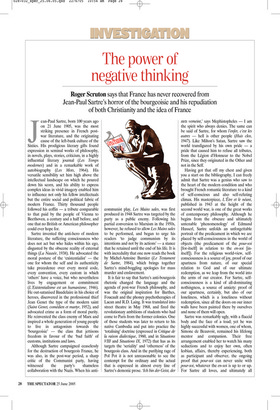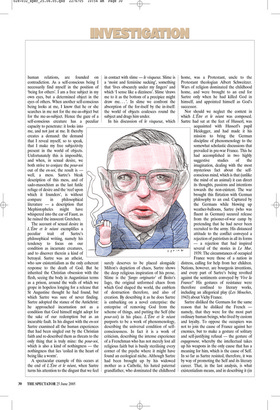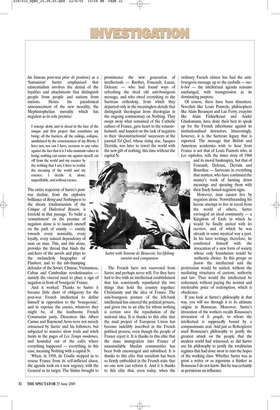The power of negative thinking
Roger Scruton says that France has never recovered from Jean-Paul Sartre’s horror of the bourgeoisie and his repudiation of both Christianity and the idea of France Jean-Paul Sartre, born 100 years ago on 21 June 1905, was the most striking presence in French postwar literature, and the originating cause of the left-bank culture of the Sixties. His prodigious literary gifts found expression in seminal works of philosophy, in novels, plays, stories, criticism, in a highly influential literary journal (Les Temps modernes) and in a remarkable work of autobiography (Les Mots, 1964). His versatile sensibility set him high above the intellectual landscape on which he poured down his scorn, and his ability to express complex ideas in vivid imagery enabled him to influence not only his fellow intellectuals but the entire social and political fabric of modern France. Thirty thousand people followed his coffin — a tribute comparable to that paid by the people of Vienna to Beethoven, a century and a half before, and one that no British or American philosopher could ever hope for.
Sartre invented the anti-hero of modern literature, the suffering consciousness who does not act but who hides within his ego, disgusted by the obscene reality of external things (La Nausée, 1938). He advocated the moral posture of the ‘existentialist’ — the one for whom the self and its authenticity take precedence over every moral code, every convention, every custom in which ‘others’ have a voice, but who nevertheless lives by engagement or commitment (L’Existentialisme est un humanisme, 1946). He out-satanised Baudelaire in his choice of heroes, discovered in the professional thief Jean Genet the type of the modern saint (Saint Genet, comédien et martyr, 1952), and advocated crime as a form of moral purity. He reinvented the class enemy of Marx and inspired a whole generation of young people to live in antagonism towards the ‘bourgeoisie’ — the class that jettisons freedom in favour of the ‘bad faith’ of customs, institutions and laws.
Although Sartre campaigned ceaselessly for the destruction of bourgeois France, he was also, in the post-war period, a sharp critic of the Communist party, having witnessed the party’s shameless collaboration with the Nazis. When his anti communist play, Les Mains sales, was first produced in 1948 Sartre was targeted by the party as a public enemy. Following his partial conversion to Marxism in the 1950s, however, he refused to allow Les Mains sales to be performed, and began to urge his readers ‘to judge communism by its intentions and not by its actions’ — a stance that he retained until the end of his life. It is with incredulity that one now reads the book by Michel-Antoine Burnier (Le Testament de Sartre, 1984), which brings together Sartre’s mind-boggling apologies for mass murder and enslavement.
It is fair to say that Sartre’s anti-bourgeois rhetoric changed the language and the agenda of post-war French philosophy, and was the original inspiration for Barthes, Foucault and the phoney psychotherapies of Lacan and R.D. Laing. It was translated into street theatre in May 1968, and fired the revolutionary ambitions of students who had come to Paris from the former colonies. One of those students was later to return to his native Cambodia and put into practice the ‘totalising’ doctrine (expressed in Critique de la raison dialectique, 1960, and in Situations VIII and Situations IX, 1972) that has as its targets the ‘seriality’ and ‘otherness’ of the bourgeois class. And in the purifying rage of Pol Pot it is not unreasonable to see the contempt for the ordinary and the actual that is expressed in almost every line of Sartre’s demonic prose. ‘Ich bin der Geist, der stets verneint,’ says Mephistopheles — I am the spirit who always denies. The same can be said of Sartre, for whom l’enfer, c’est les autres — hell is other people (Huis clos, 1947). Like Milton’s Satan, Sartre saw the world transfigured by his own pride — a pride that caused him to refuse all tributes, from the Légion d’Honneur to the Nobel Prize, since they originated in the Other and not in the Self.
Having got that off my chest and given you a start on the bibliography, I can freely admit that Sartre was a genius who saw to the heart of the modern condition and who brought French romantic literature to a kind of self-conscious and also self-refuting climax. His masterpiece, L’Être et le néant, published in 1943 at the height of the second world war, is one of the great works of contemporary philosophy. Although he begins from the obscure and ultimately untenable ‘phenomenology’ of Edmund Husserl, Sartre unfolds an unforgettable portrait of the predicament in which we are placed by self-consciousness in the world of objects (the predicament of the pour-soi [for-itself] in relation to the en-soi [initself]). For the religious world-view, selfconsciousness is a source of joy, proof of our apartness from nature, of our special relation to God and of our ultimate redemption, as we leap from the world into the arms of our creator. For Sartre, selfconsciousness is a kind of all-dominating nothingness, a source of anxiety: proof of our apartness, certainly, but also of our loneliness, which is a loneliness without redemption, since all the doors on our inner walls have been painted there by ourselves and none of them will open.
Sartre was remarkably ugly, with a flaccid body and the face of a toad; yet he was highly successful with women, one of whom, Simone de Beauvoir, remained his lifelong mentor and companion. Their free arrangement enabled her to watch his many seductions and to enjoy her own, often lesbian, affairs, thereby experiencing, both as participant and observer, the ongoing proof that pour-soi can never unite with pour-soi, whatever the en-soi is up to or up. For Sartre all loves, and ultimately all human relations, are founded on contradiction. As a self-conscious being I necessarily find myself in the position of ‘being for others’. I am a free subject in my own eyes, but a determined object in the eyes of others. When another self-conscious being looks at me, I know that he or she searches in me not for the me-as-object but for the me-as-subject. Hence the gaze of a self-conscious creature has a peculiar capacity to penetrate: it looks into me, and not just at me. It thereby creates a demand: the demand that I reveal myself, so to speak, that I make my free subjectivity present in the world of objects. Unfortunately this is impossible, and when, in sexual desire, we both strive to conjure the pour-soi out of the en-soi, the result is well, a mess. Sartre’s bleak description of this mess, and of sado-masochism as the last futile refuge of desire and the ‘reef upon which it founders’, is without compare in philosophical literature — a description that Mephistopheles might have whispered into the ear of Faust, as he ruined the innocent Gretchen.
The account of sexual desire in L’Être et le néant exemplifies a peculiar trait of Sartre’s philosophical writing, namely his tendency to focus on our condition as incarnate creatures, and to discover therein a kind of betrayal. Sartre was an atheist, who saw existentialism as the only coherent response to the death of God. But he inherited the Christian obsession with the flesh, seeing the body in Augustinian terms as a prison, around the walls of which we grope in hopeless longing for a release that St Augustine thought he had found, but which Sartre was sure of never finding. Sartre adopted the stance of the Antichrist: he approached incarnation not as a condition that God himself might adopt for the sake of our redemption but as an incurable fault. In his disgust with the en-soi Sartre examined all the human experiences that had been singled out by the Christian faith and re-described them as threats to the only thing that is truly mine: the pour-soi, which is also a kind of nothingness — the nothingness that lies ‘coiled in the heart of being like a worm’.
A spectacular example of this occurs at the end of L’Être et le néant, when Sartre turns his attention to the disgust that we feel in contact with slime — le visqueux. Slime is a ‘moist and feminine sucking’, something that ‘lives obscurely under my fingers’ and which ‘I sense like a dizziness’. Slime ‘draws me to it as the bottom of a precipice might draw me... ’. In slime we confront the absorption of the for-itself by the in-itself: the world of objects coalesces round the subject and drags him under.
In his discussion of le visqueux, which surely deserves to be placed alongside Milton’s depiction of chaos, Sartre shows the deep religious inspiration of his prose. Slime is the ‘fango originario’ of Boito’s Iago, the original unformed chaos from which God shaped the world, the emblem of destruction therefore, and also of creation. By describing it as he does Sartre is embarking on a novel enterprise: the enterprise of removing God from the scheme of things, and putting the Self (the pour-soi) in his place. L’Être et le néant purports to be a work of phenomenology, describing the universal condition of selfconsciousness. In fact it is a work of criticism, describing the intense experience of a Frenchman who has not merely lost all religious faith but is busily sterilising every corner of the psyche where it might have found an ecological niche. Although Sartre had been brought up by his widowed mother as a Catholic, his hated paternal grandfather, who dominated the childhood home, was a Protestant, uncle to the Protestant theologian Albert Schweitzer. Wars of religion dominated the childhood home, and were brought to an end for Sartre only when he had killed God in himself, and appointed himself as God’s successor.
Nor should we neglect the context in which L’Être et le néant was composed. Sartre had sat at the feet of Husserl, was acquainted with Husserl’s pupil Heidegger, and had made it his mission to bring the German discipline of phenomenology to the somewhat scholastic discussions that prevailed in pre-war France. This he had accomplished in two highly suggestive studies of the imagination, dealing with the most mysterious fact about the selfconscious mind, which is that (unlike the mind of an animal) it can direct its thoughts, passions and intentions towards the non-existent. The war brought this flirtation with German philosophy to an end. Captured by the Germans while blowing up weather-balloons, Sartre (who was fluent in German) secured release from the prisoner-of-war camp by pretending that he had never been recruited to the army. His distanced attitude to the conflict conveyed a rejection of patriotism in all its forms — a rejection that had inspired several of the stories in Le Mur, 1939. The circumstances of occupied France were those of a nation in distress, calling for help from her children. Nations, however, are bourgeois inventions, and every part of Sartre’s being revolted against the sentiments conveyed by ‘Vive la France!’ His gestures of resistance were therefore confined to literary works, including an allegorical play (Les Mouches, 1943) about Vichy France.
Sartre disliked the Germans for the same reason that he disliked the French namely, that they were for the most part ordinary human beings, who lived by custom and loyalty. To oppose the occupiers was not to join the cause of France against her enemies, but to make a gesture of solitary and self-justifying refusal — the gesture of engagement, whereby the intellectual takes up his weapons in the only cause that has a meaning for him, which is the cause of Self. In so far as Sartre resisted, therefore, it was by way of promoting the Self and its literary career. That, in the last analysis, is what existentialism means, and in describing it (in his famous post-war prise de position) as a ‘humanism’ Sartre emphasised that existentialism involves the denial of the loyalties and attachments that distinguish people from people and nations from nations. Hence his paradoxical announcement of the new morality, the Mephistophelian morality which has negation as its sole premise:
I emerge alone and in dread in the face of the unique and first project that constitutes my being: all the barriers, all the railings, collapse, annihilated by the consciousness of my liberty; I have not, nor can I have, recourse to any value against the fact that it is I who maintain values in being; nothing can assure me against myself; cut off from the world and my essence by the nothing that I am, I have to realise the meaning of the world and my essence: I decide it, alone, unjustifiable, and without excuse.
The entire trajectory of Sartre’s postwar decline, from the explosive brilliance of Being and Nothingness to the dreary totalitarianism of the Critique of Dialectical Reason, is foretold in that passage. To build a ‘commitment’ on the premise of negation alone is to launch oneself on the path of enmity — enmity towards every normality, every loyalty, every natural dependency of man on man. This, and this alone, provides the thread that binds the anti-hero of the novels and plays to the melancholy biographer of Flaubert, and to the tub-thumping defender of the Soviet, Chinese, Vietnamese, Cuban and Cambodian revolutionaries namely the visceral need to place a sign of negation in front of ‘bourgeois’ France.
And it worked. Thanks to Sartre it became little short of obligatory for the post-war French intellectual to define himself in opposition to the ‘bourgeoisie’, and to espouse the causes, whatever they might be, of the loathsome French Communist party. Dissenters like Albert Camus and Raymond Aron were not merely ostracised by Sartre and his followers, but subjected to massive show trials and witch hunts in the pages of Les Temps modernes, and hounded out of the cafés where everything happened — everything, in this case, meaning Nothing with a capital N.
When, in 1958, de Gaulle stepped in to rescue France from its self-inflicted chaos, the agenda took on a new urgency, with the General as its target. The Sixties brought to prominence the new generation of intellectuals — Barthes, Foucault, Lacan, Deleuze — who had found ways of refreshing the tired old anti-bourgeois message, and who owed everything to the Sartrean orthodoxy, from which they departed only in the meaningless details that distinguish theologian from theologian in the ongoing commentary on Nothing. They swept away what remained of the Catholic culture of France, gave heart to the soixantehuitards, and handed on the task of negation to their ‘deconstructionist’ successors at the journal Tel Quel, whose rising star, Jacques Derrida, was later to travel the world with the new gift of nothing, this time without the capital N.
The French have not recovered from Sartre and perhaps never will. For they have had to live with an intellectual establishment that has consistently repudiated the two things that hold the country together: Christianity and the idea of France. The anti-bourgeois posture of the left-bank intellectual has entered the political process, and given rise to an elite for whom nothing is certain save the repudiation of the national idea. It is thanks to this elite that the mad project of European Union has become indelibly inscribed in the French political process, even though the people of France reject it. It is thanks to this elite that the mass immigration into France of unassimilable Muslim communities has been both encouraged and subsidised. It is thanks to this elite that socialism has been so firmly embedded in the French state that no one now can reform it. And it is thanks to this elite that, even today, when the ordinary French citizen has had the antibourgeois message up to the eyeballs — rasle-bol — the intellectual agenda remains unchanged, with transgression as its dominating purpose.
Of course, there have been dissenters. Novelists like Louis Pauwels, philosophers like Alain Besançon and Luc Ferry, essayists like Alain Finkielkraut and André Glucksmann, have done their best to speak up for the French inheritance against its institutionalised detractors. Interestingly, however, it is the Sartrean legacy that is exported. The message that British and American academics wish to hear from France is not that of Louis Pauwels who, in Les orphelins, tells the inner story of 1968 and its moral bankruptcy, but that of Foucault, Deleuze, Derrida and Bourdieu — Sartreans in everything that matters, who have continued the master’s work of hunting down meanings and spearing them with their finely honed negation signs.
However, man cannot live by negation alone. Notwithstanding his heroic attempt to live in recoil from the world of others, Sartre envisaged an ideal community — a Kingdom of Ends in which he would be finally united with les ouvriers, and of which he was already in some mystical way a part. In his later writings, therefore, he comforted himself with the invocation of a new form of society whose only foundation would be authentic choice. In this groupe en fusion the intellectual and the proletarian would be united, without the mediating structures of custom, authority and law. Thus would the intellectual be redeemed, without paying the normal and intolerable price of redemption, which is obedience.
If you look at Sartre’s philosophy in that way, you will see through it to its ultimate origins in Rousseau. Moreover, Sartre’s invocation of the workers recalls Rousseau’s invocation of le peuple, to whom the intellectual is supposedly bound by a compassionate zeal. And just as Robespierre used Rousseau’s philosophy to justify the greatest attack on the people that the modern world had witnessed, so did Sartre use his philosophy to justify the totalitarian regimes that had done most to ruin the hopes of the working class. Whether Sartre was as great a writer or as ingenious a thinker as Rousseau I do not know. But he was certainly as pernicious an influence.




































































 Previous page
Previous page